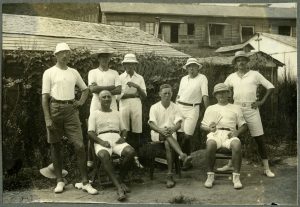German Prisoners of War in Japan 1914-1920: towards a new narrative

In 2014 the 100th anniversary of the outbreak of the First World War was globally remembered in academic and public functions, in lectures, exhibitions, and publications. The centenary in itself demonstrated a rejection of the prevailing narratives of the First World War and smoothed the way for alternative points of view. In the memory culture of the First World War also Japan takes its part since it entered the war in 1914 against the German Reich and was represented in Versailles in 1919 as one of the victorious powers.
As far as the German-Japanese relations are concerned, however, a major point of interest are the German prisoners of war who were taken captives by the Japanese in November 1914 after having defended Tsingtao for three months. In the context of German-Japanese relations they are taken up time and again. In the wake of the centennial of the First World War historical science is at present revising earlier conceptions of the historiography of the First World War. With the exception to the last major study on the subject by Ulrike Klein (Freiburg, 1993), however, research on the German POWs interned in Japan during World War I has never moved beyond a biased and euphemistic conception of German captivity in Japan.